EXPLORAR EL CATALOGO DE CURSOS
Courses and Pathways in Technology, Design and Engineering

The course Innovative, Sustainable and Clean Energy, developed by the UNESCO Chair in Innovative, Sustainable and Clean Energy Research and Education in the framework of the UNITWIN-UNESCO program, aims to provide an overview of the different green technologies for clean and innovative energy production, following the recent International policies. After providing an overview of the different energy and environmental policies, which represent a key-point from the strategic standpoint, different renewable energy solutions (wind, solar, hydro, bioenergies) are presented and investigated, focusing for each solution on practical applications, theoretical and experimental R&D activities, on-going projects and impact in different Countries and scenarios. This course will be followed by a Second Pack of lessons more focused on energy management technologies (storage, e-fuels, energy vectors) and sustainable transports.


Climate change is a rising political priority for European citizens. In the fight against climate change, innovation is key to help develop the clean energy solutions to produce, consume and move differently.
To understand the challenges of the EU innovation policies in the energy transition, the Jacques Delors Institute propose a free online course : 9 short videos to grasp what is a genuine energy transition, how innovation is born and funded, meeting real-life innovators and see what Europe can do for them.
A course with three entrepreneurs in Energy innovation and four experts from the European Commission’s Think tank, from E3G, and from the Jacques Delors Institute.
[All videolectures in the course are subtitled in Italian.]

- Profesor: MARIE DELAIR
Il tema della efficienza energetica e della qualità ambientale degli edifici è al centro di questo corso che rappresenta il primo modulo del Master di II livello BEEbasic - Building, Energy and Environment dell'Università di Bolzano destinato a progettisti. Il corso è articolato in cinque sezioni che forniranno le basi disciplinari necessarie per comprendere le variabili in gioco quando l’obiettivo è la progettazione e la riqualificazione della prestazione energetica e ambientale degli edifici.

- Profesor: MARCO BARATIERI
- Profesor: ANDREA GASPARELLA
- Profesor: DARIO PRANDO
- Planet: to protect the planet from degradation and to promote the sustainable management of natural resources and taking urgent action on climate change in the perspective to support the needs of the present and future generations.
- Prosperity: to ensure good level of prosperity at all human beings, and economic, social and technological progress occurs in harmony with nature.
- Peace: to strengthen peace around the world and guarantee peaceful, just and inclusive societies which are free from fear and violence.
- Partnership: to implement the Global Partnership for Sustainable Development, based on a spirit of strengthened global solidarity, focussed in particular on the needs of the poorest and most vulnerable and with the participation of all countries and all stakeholders.
- People: to end poverty and hunger, in all their forms and dimensions.

- Profesor: GIOVANNI FERRI



